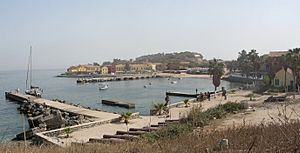Joseph Wall (colonial administrator) facts for kids
Joseph Wall was a British Army officer who became the Lieutenant Governor of Gorée, an island near Dakar, Senegal. He was later executed in London because he caused the death of one of his soldiers through severe punishment. Many people came to watch his execution due to the public interest in his case.
Contents
Early Life and Army Start
Joseph Wall was born in Dublin, Ireland, in 1737. His father was a respected farmer. When he was 15, Joseph started studying at Trinity College, Dublin. However, he decided he wanted a career in the army instead of being a student. In 1760, he joined the British Army as a cadet and volunteered to serve in other countries.
Military Adventures Overseas
In 1762, Wall showed bravery during the capture of Havana in Spanish Cuba, which was part of the Seven Years' War. By 1763, he had become a captain. He then worked for the East India Company in Bombay, India.
By 1773, Wall was working in Senegambia, West Africa. He was arrested there for being cruel. Later, he sued for this arrest and won £1,000 in damages. After this, Wall returned to England.
Becoming a Colonial Governor
By 1779, Joseph Wall became the Lieutenant Governor of Gorée, an island off the coast of Senegal. This port was once a part of the Atlantic slave trade. However, by the time Wall became governor, the island had become important for shipping goods like peanuts, peanut oil, gum arabic, and ivory.
Being the governor of Gorée was a challenging job. The weather was very hot, and diseases were common. The soldiers stationed there were often difficult to manage. Many of them were poor recruits sent to Gorée as a form of punishment.
During his trip to Gorée, Wall ordered a soldier named Green to be severely punished. The soldier was badly hurt and died soon after. This event deeply affected Wall's own brother, Ensign Patrick Wall, who died shortly after arriving in Gorée. By early 1782, Wall's health was not good, and he began to prepare to leave the colony.
Unjust Punishments
On July 10, 1782, just before Wall left Gorée, some soldiers came to him. They were led by Sergeant Benjamin Armstrong and asked for their unpaid wages. Wall, who was not sober, ordered Sergeant Armstrong to be arrested, claiming it was a mutiny (a rebellion).
Without holding a proper military trial, Wall ordered several men to be punished with a thick rope. On July 10, Sergeant Benjamin Armstrong and George Robinson each received 800 lashes. On July 11, Corporal Thomas Upton received 350 lashes, Private George Paterson 800 lashes, William Evans 800 lashes, Joseph Shaw 275 lashes, and Private Henry Fawcett 47 lashes. Sadly, Corporal Upton died on July 13, Sergeant Armstrong on July 15, and George Paterson on July 19 due to their injuries.
Trial and Execution
Joseph Wall was charged with the murders of Sergeant Benjamin Armstrong, Sergeant George Paterson, and Corporal Thomas Upton.
On January 20, 1802, Wall was tried for the murder of Sergeant Armstrong at the Old Bailey court. The court heard evidence from a surgeon and a sergeant who were present during Armstrong's punishment. The court decided there was no evidence that the soldiers had rebelled. Wall said he had left the country in 1784 because he felt he would not get a fair trial.
The trial lasted a long time, from 9 AM to 11 PM. The court found Wall guilty. His wife's relative, Charles Howard, the Duke of Norfolk, tried hard to get him pardoned, but it did not work. Wall was ordered to be executed on January 28, 1802.
On the day of his execution, Wall left Newgate Prison. A very large crowd gathered to watch. Many people thought there might be a riot if Wall was pardoned. After he was executed, his body was given to his family. He was buried at St Pancras Old Church in central London. Wall's fate was influenced by strong public opinion. The British government felt it was important to punish officers who were cruel to their soldiers, especially after other soldier rebellions had occurred.
Wall's Legacy
Joseph Wall was a tall man, described as having a "gentlemanly appearance." He had several children with his wife, Frances.
Wall had a brother named Augustine, who also served in the army. Augustine later became a lawyer in Ireland and was known for his writing. He was also the first person to publish full parliamentary reports, showing what speakers said.
Because of Wall's actions, some items were made to remember his crime. For example, a drinking horn was carved with a picture of Armstrong's punishment and a message from Wall.
 | William L. Dawson |
 | W. E. B. Du Bois |
 | Harry Belafonte |


